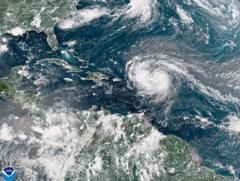As the climate summit in Baku, Azerbaijan, unfolds, the focus has shifted from addressing global warming to grappling with the implications of the U.S. election results and Trump's expected policy reversals.
**Global Climate Conference Uncertainty Amidst U.S. Election Concerns**

**Global Climate Conference Uncertainty Amidst U.S. Election Concerns**
World leaders and diplomats at COP29 face a challenge with the anticipated return of Donald Trump to political power.
In a significant turn of events, the COP29 climate summit in Baku, Azerbaijan commenced with focused discussions on essential funding to combat climate change. However, these discussions have quickly devolved into concerns regarding the recent U.S. election and the looming potential of Donald Trump returning to the presidency in January. Trump’s past stance indicated a probable withdrawal from the Paris climate agreement and a rejection of commitments to greenhouse gas reductions, casting doubts among global leaders regarding future cooperative efforts to tackle climate issues.
Countries engaged in the summit are striving to maintain a hopeful outlook despite the disheartening news. Yalchin Rafiyev, Azerbaijan’s deputy minister of foreign affairs, expressed optimism by stressing that “Success does not depend on one country alone — it depends on all of us.” This sentiment underscores the collective responsibility nations share in confronting climate challenges, a necessity now increasingly urgent in the face of shifting political dynamics in the United States.
As negotiations progress, the overarching question remains: can genuine transformative action be sustained on climate change without the involvement and commitment of America's leadership in global agreements?
Countries engaged in the summit are striving to maintain a hopeful outlook despite the disheartening news. Yalchin Rafiyev, Azerbaijan’s deputy minister of foreign affairs, expressed optimism by stressing that “Success does not depend on one country alone — it depends on all of us.” This sentiment underscores the collective responsibility nations share in confronting climate challenges, a necessity now increasingly urgent in the face of shifting political dynamics in the United States.
As negotiations progress, the overarching question remains: can genuine transformative action be sustained on climate change without the involvement and commitment of America's leadership in global agreements?






















